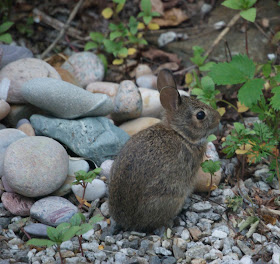
















Here yet another mystery butterfly eyed in the garden. This one sits upon a wood anemone looking very fresh and lady like with its collar of lace. The third butterfly I have not found in my 'Audubon Society Field Guide to North American Butterflies' which leads me to seek out another more comprehensive guide or perhaps some of you out there in the virtual world may know what lepidopterist have labeled this little specimen. I love the wild in our gardens... all the gardens are rather informal and rambling but I truly delight in the hundreds of field wild flowers that are returning after their seeds waited for years for a chance to swell and flourish into the light of day tickled by butterflies and combed by moths in the cool glow of moonlight.
It took a committed gardener/farmer to fight for their rights to set roots again, where invasive saplings, briars and vines were rampant. If one looks closely, the growth of honey locust, wild roses and sumach and more still continue on and will climb high over the delicate plants of wild geranium, false solomon's seal, clovers, wild strawberries and sweet rocket to mention a few I can name. It has taken years to finally have the fields filled with such lovely flowers both for their beauty and the food they supply to countless bees and butterflies. We must now walk in and around the fields and nip those undesirables out from where they attempt to grow, leaving the goldenrod and asters for later blooms. The blueberry fields too have won over from the hard efforts of many over the last decade. We remain vigilant in our efforts to cut out young maple, beech or birch saplings that want to grow in the middle of a blueberry shrub. Those splendid trees have free rein in the forest, but the fields will remain open for wild native plants bearing nectar and fruit for all life about this farm. That is of course as long as the gardeners are able to keep up the charge.
One plant native to Europe and Asia was introduced by myself truly into the gardens and has become wild-like with a not so welcome habit of wandering all over the grounds. The plant I refer to is Comfrey also known as Boneset or Slippery Root, for it has a long fleshy root that makes it hard to dig completely out and with one tiny piece the clever herbaceous being can regenerate itself. I do tolerate it in my rather untidy garden beds for its lovely spiraling clusters of mauve tubular flowers that you will note... in the first four photos above... the hummingbird adores. It must be nutritious nectar for the plant is high in nitrogen and was originally placed near the compost ... which has moved around over the years as the gardens have expanded, leaving bits of comfrey to multiply here and there. I am also beholding to Comfrey for curing me of eczema oh so many years ago now. Another of Comfrey's attributes is that it is a blood purifier (I should throw out a word of caution here... take care in how fast you clean your blood, for the liver can have an overdose of toxins... it gave me no ills but I have heard tales of near death.) so it is a struggle to remove Comfrey, in both a psychological and physical way, but we continue to do so only to have it return year after year. Uprooting begins after the flowers have passed so as not to upset the hummingbird.
I am quite happy with the purple-black columbines that are naturalizing in the old rock garden area just beneath an old apple tree (where the wild honey bee swarm was recently). I am guessing it is the Aquilegia vulgaris "Magpie". I marvel at how they can grow up through the tenacious bishop's weed which has taken over that area as well as most of the gardens. The key is to grow taller than the bishop's or gout weed. The beloved hummingbird also visits the columbine so we are pleased all around for the astute self-sowing columbine.
This last day of May ends with kudos to 'Native Wild Things' (along with a few non native... non invasive plants... especially that lovely stand of Dame's (sweet) rocket in the north field) may they 'live long and prosper'... we take exception to rabbits that eat our wild and cultivated things!
